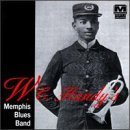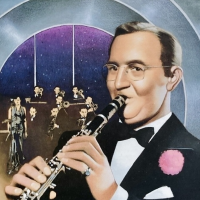Home » Jazz Musicians » W.C. Handy
W.C. Handy
William Christopher Handy, known as “the father of the blues,” was the first person to notate and publish blues songs, and is recognized for integrating blues elements into ragtime, which was a seminal form of jazz, changing the course of popular music. He wrote over 60 blues, spirituals, and popular tunes, including the perennial blues standard St. Louis Blues. W.C. Handy was born in Florence, Alabama, November 16, 1873, the son of former slaves. His first instrument was the coronet, and he advanced from lessons in a barbershop to studying classical music. While still a teenager Handy began teaching school but left for better paying work in a factory. At the age of twenty, he organized a quartet to play the 1893 Chicago World's Fair, a gathering that attracted other musical luminaries of the time, notably ragtime pianist Scott Joplin. After the fair, Handy toured with various ensembles and taught music at Alabama A&M in Huntsville. He left teaching and joined Mahara's Minstrels in 1896 as a cornetist. Handy toured the country with the group, and quickly became their leader. In 1903, he moved to Clarksdale, Mississippi, to direct the Colored Knights of Pythias, an entourage that performed for both whites and blacks. During a performance for a white audience, a request was made to "play some of your own music." When the band resumed, the whites shouted that Handy was not honoring their request. During a break, three local black men with stringed instruments took the stage and played a primitive blues that brought an appreciative reaction from the crowd. The crowd's reaction caused the bandleader to reconsider the band's repertoire, noting the strong response that "primitive music" created. In 1903, while waiting for a train at a station in Tutwiler, Mississippi, Handy heard a black musician playing a guitar with a knife. The man was singing about going Where The Southern Crosses The Dog, and Handy recalled "it was the weirdest music I'd ever heard." The man's singing was answered by the crying sound that his guitar made as the knife slid along its metal strings. The influence of rural song forms on the classically trained Handy would find its celebrated outlet in his published work. Handy lived and worked in Clarksdale until 1909, when he moved to another musical hotspot: Memphis. There he published "Mr. Crump" in 1909. This political song for Memphis's mayor remained popular and was covered by Memphis musicians, including Frank Stokes, long after Crump left office.
Read moreTags
Bill O'Connell New Release 'Live In Montauk' (Savant Records) Featuring Randy Brecker, Billy Hart, Craig Handy And Santi Debriano! Release Date: June 23rd

Source:
Scott Thompson Public Relations
Montauk—the easternmost point of Long Island—has enjoyed a reputation as an idyllic land of the lotus and poppy but now is fully woven in to the Hamptons summer scene. The charms and views associated with that coastal existence served as a backdrop for the creation of this recording. Notable for a number of reasons—as the first live band date in a lengthy discography, and a first on-record meeting with drumming icon Billy Hart—this Bill O’Connell session stands out. Recorded live ...
read more
Fats, Hoagy & W.C. Handy: Music Made In America This Week On Riverwalk Jazz

Source:
Don Mopsick
This week Riverwalk Jazz explores the rich legacy of three jazz heroes whose work has inspired The Jim Cullum Jazz Band through the years—Fats Waller, Hoagy Carmichael and the work of W.C. Handy known as the “Father of the Blues." Series favorites Vernel Bagneris, Topsy Chapman and Shelly Berg join the band on the stage of Pearl Stable, a century-old limestone horse stable transformed into a state-of-the-art theater at San Antonio’s historic Pearl Brewery. The program is distributed in the ...
read more
Fats, Hoagy And W.C. Handy This Week On Riverwalk Jazz

Source:
Don Mopsick
This week Riverwalk Jazz explores the rich legacy of three jazz heroes whose work has inspired The Jim Cullum Jazz Band through the years—Fats Waller, Hoagy Carmichael and the blues-driven work of W.C. Handy. Series favorites Vernel Bagneris, Topsy Chapman and Shelly Berg join the band on the stage of Pearl Stable, a century-old limestone horse stable transformed into a state-of-the-art theater at San Antonio’s historic Pearl Brewery. The program is distributed in the US by Public Radio International, on ...
read more
Craig Handy Quartet Perform at Rue 57 (NYC) Tuesday November 9

Source:
Decibel
"What distinguishes Handy's work is that, unlike dozen of his contemporaries he wastes no notes. He reveals in every solo an elegantly intelligent structure. And Handy always finds lyricism in the eye of a hurricane." —Thomas Conrad Saxophonist Craig Handy returns by popular demand to Rue 57, 60 West 57th Street, on Tuesday, November 9 for a special evening of music with a quartet featuring organist Kyle Kholer, guitarist Matt Chertkoff and drummer Mclenty Hunter. You'll find the band downstairs ...
read more
Saxophonist Craig Handy Interviewed at AAJ

Source:
All About Jazz
Saxophonist Craig Handy is a musician's musician. Those “in the know" know about him, which is why he's been a first call player in New York for over two decades. He is a careful, thoughtful improviser--expansive and precise. His solos build on a rich knowledge of the tradition at the same time as they often set out for the edge, walk it, but never fall off. While he derives portions of his vocabulary from the'Trane/Shorter axis, there is a shrewd ...
read more
Songs of Hoagy Carmichael, W.C. Handy, Harry Revel/Noble Sissle at 10/13 "Where We Come From"

Source:
Reva Cooper
Kaufman Center and New York Festival of Song (NYFOS, www.nyfos.org) will present Where We Come From on Tuesday October 13, 8 PM at Merkin Concert Hall at Kaufman Center. This concert, which opens NYFOS’s 22nd season, celebrates the festival’s newly formed Artist Council with a musical journey that explores the backgrounds, the birthplaces, and the artistic homes of the cast, a team of highly acclaimed singers, ranging from Russia to Canada, and covering a wide swath of the United States. ...
read more
Mark Rapp Set to Play WC Handy Jazz Festival

Source:
Michael Ricci
This weekend (July 24 & 25), trumpeter and composer Mark Rapp and his NY-based band will come back for a second year in a row bringing his original sounds of contemporary/modern Jazz to Florence, Alabama at the 28th annual WC Handy Festival. Past festivals have had such greats as Dizzy Gillispie, Take6, Henry Butler, Ellis Marsalis and more and Rapp duly notes, “I'm very excited to be back south and honored to play such a highly regarded festival." ...
read more
Blues Capitalist W. C. Handy

Source:
Michael Ricci
If Beale Street could talk, it would say, Who the hell is the guy depicted in that big statue by the entrance to the park?
W. C. Handy, once so famous as the Father of the Blues that he was memorialized with a bronze monument in Memphis, is not nearly as well known today to people who are not either music scholars or copyright lawyers. It has been 35 years since James Baldwin paid tribute to Handy by employing a ...
read more
Hal McKusick on George Handy

Source:
JazzWax by Marc Myers
Few big band arrangers were as nervy or as eccentric as George Handy. This was as true of Handy's music as it was of his personality. In the 1940s and 1950s, Handy's big-band writing fearlessly blended classical motifs and modal concepts with swing and 52nd Street bebop. More than 50 years later, the results remain as fresh and as exciting as when they were first penned and recorded. But Handy [pictured] had a wild streak, which saxophonist and bandmate Hal ...
read more
Bob Effros
trumpetGaucho
band / ensemble / orchestraPhotos
Music
Recordings: As Leader | As Sideperson























